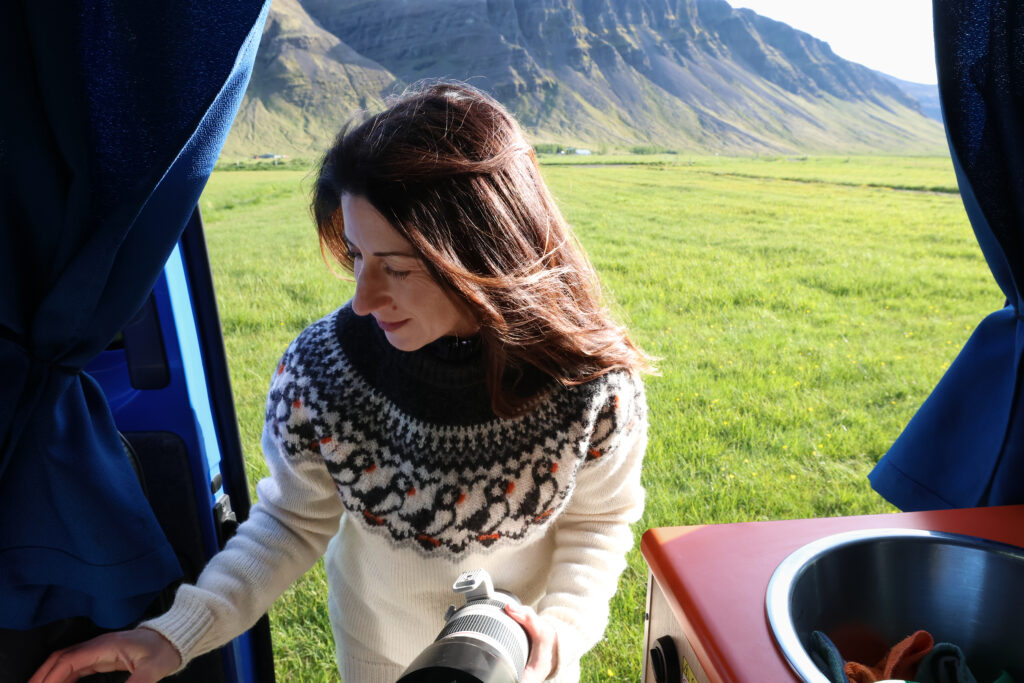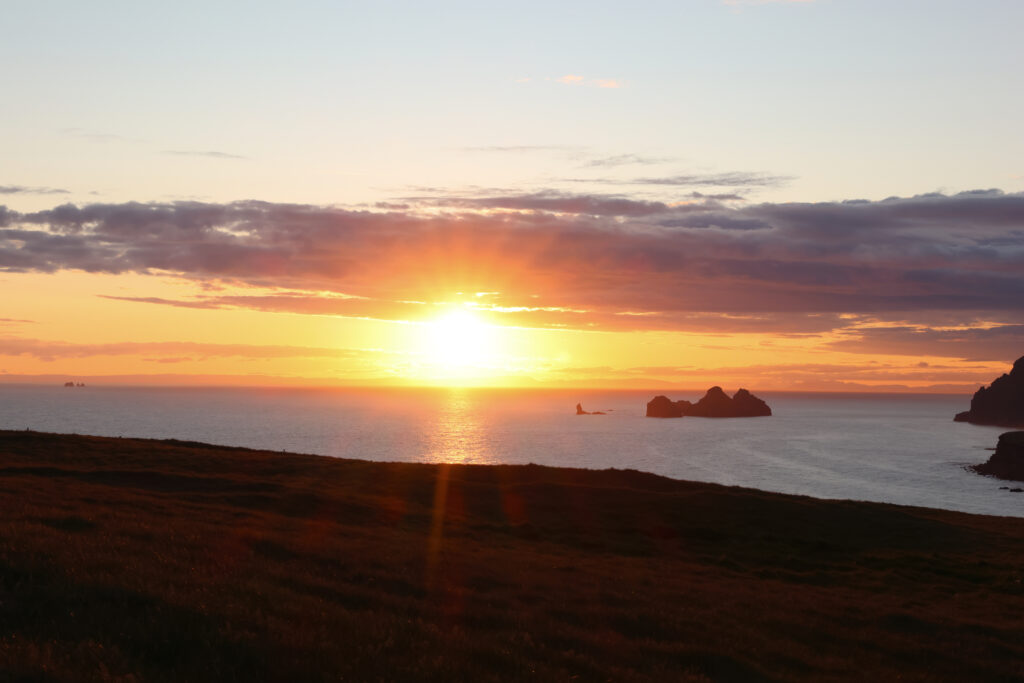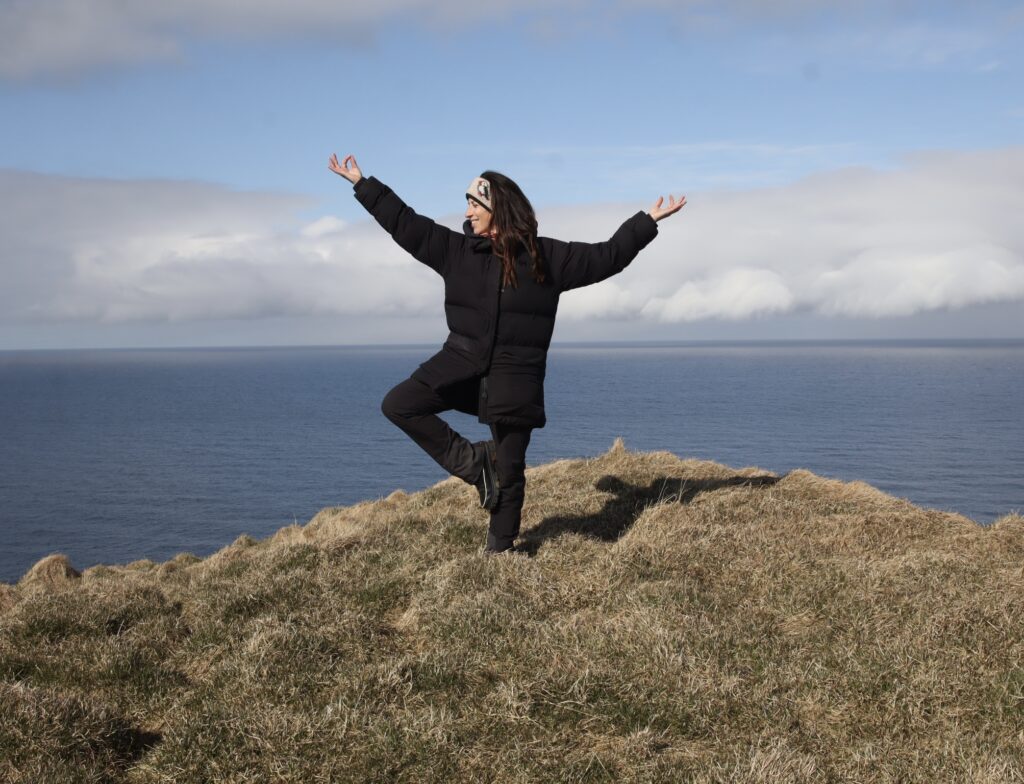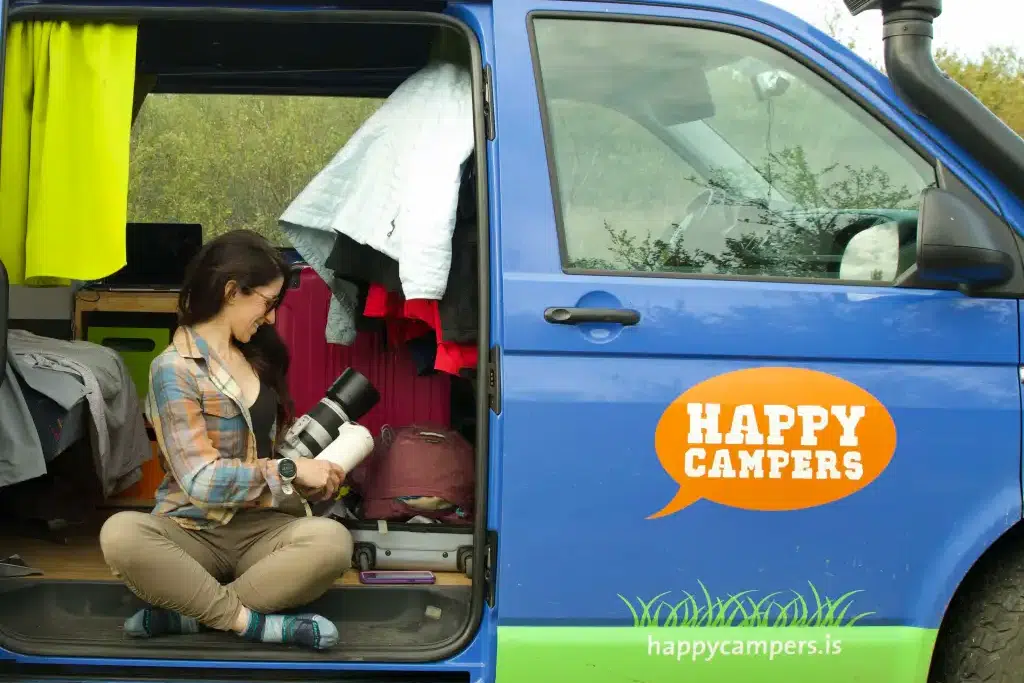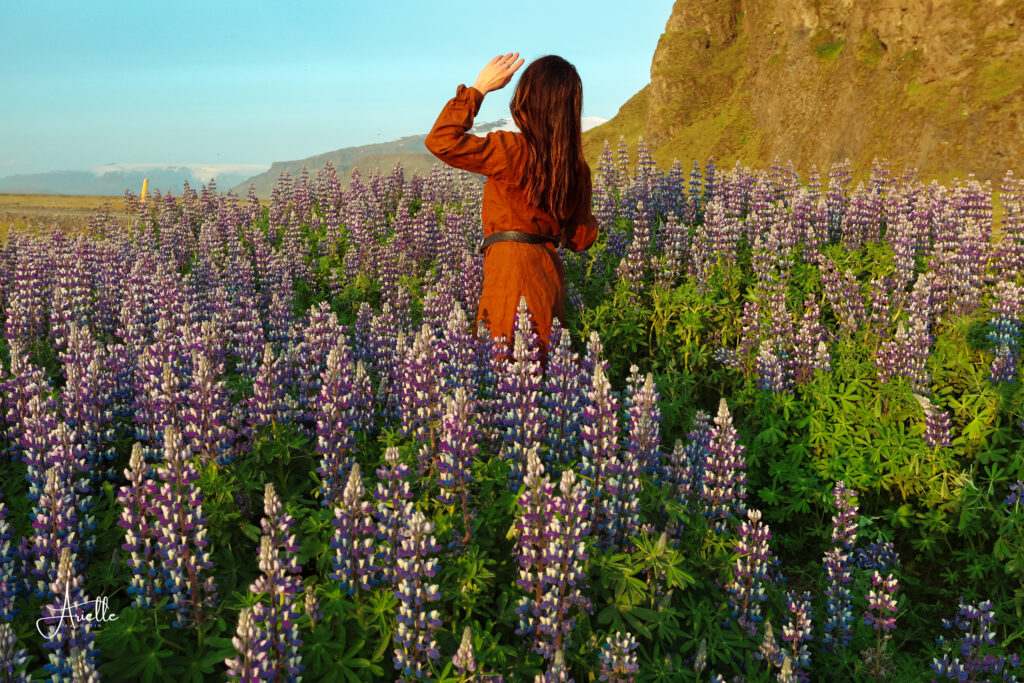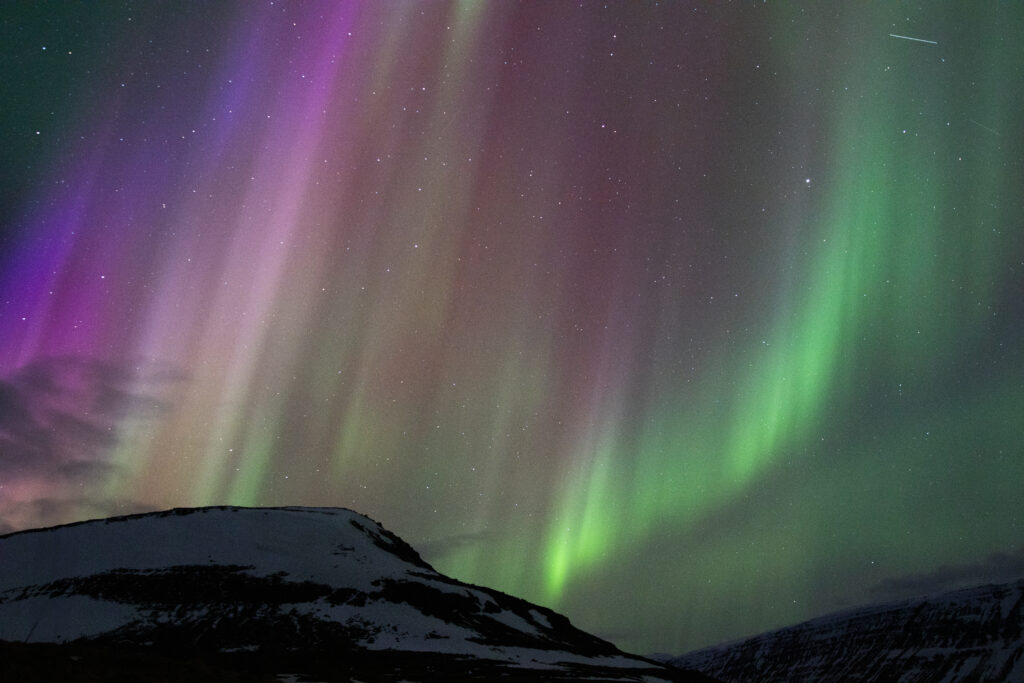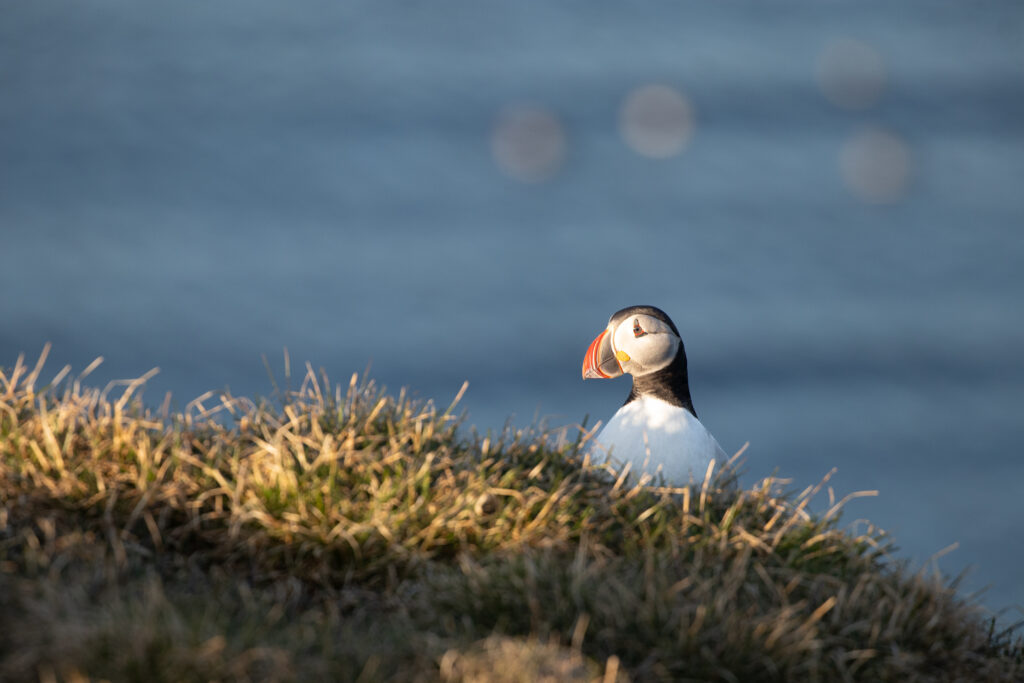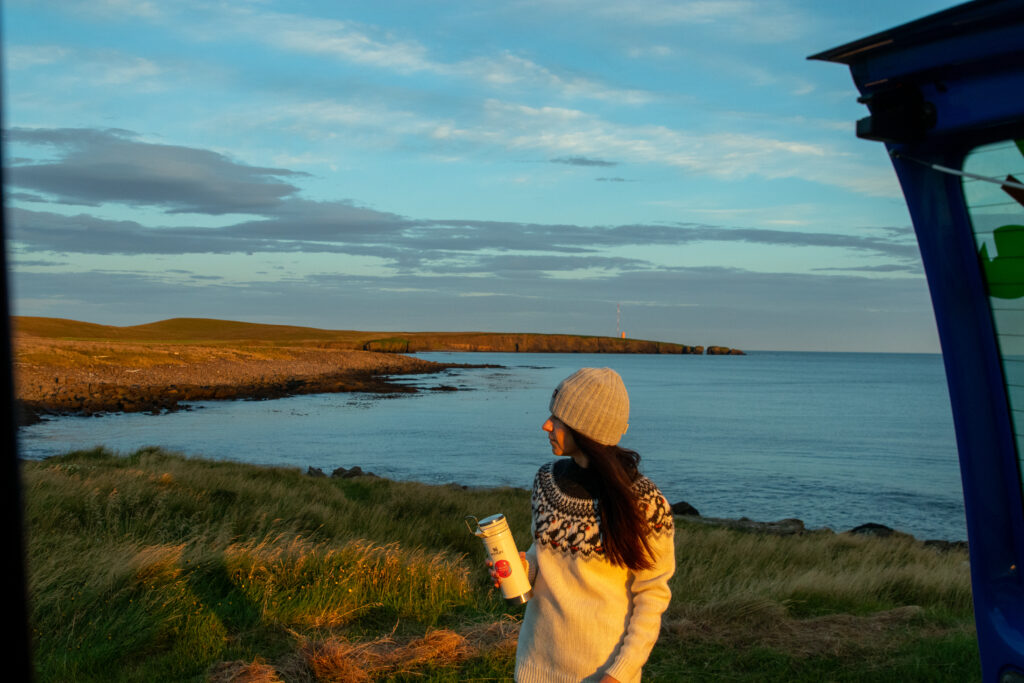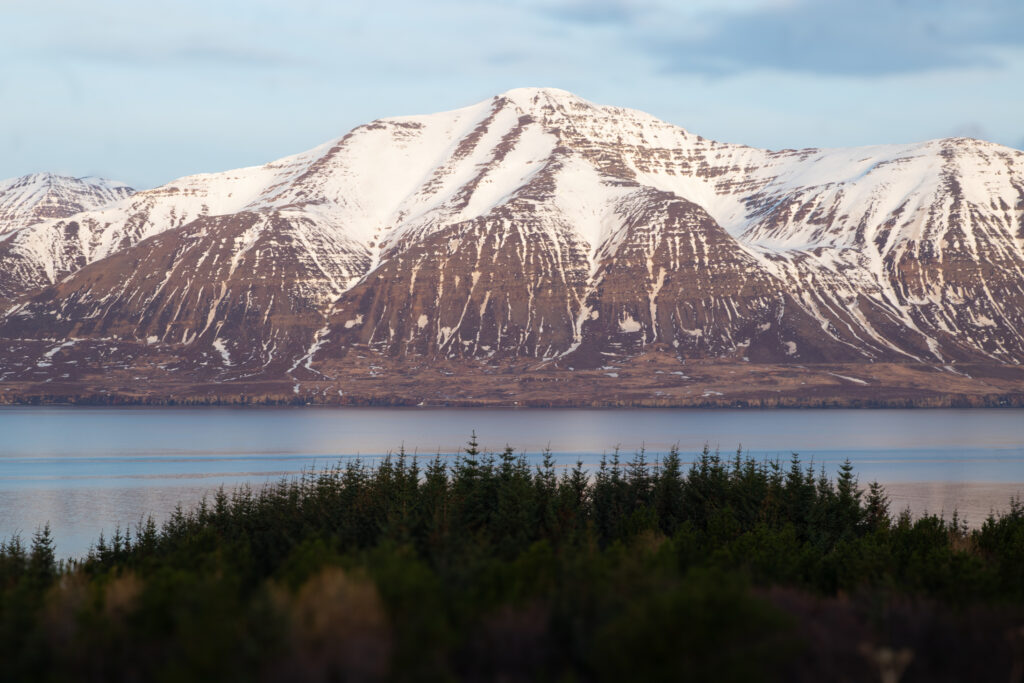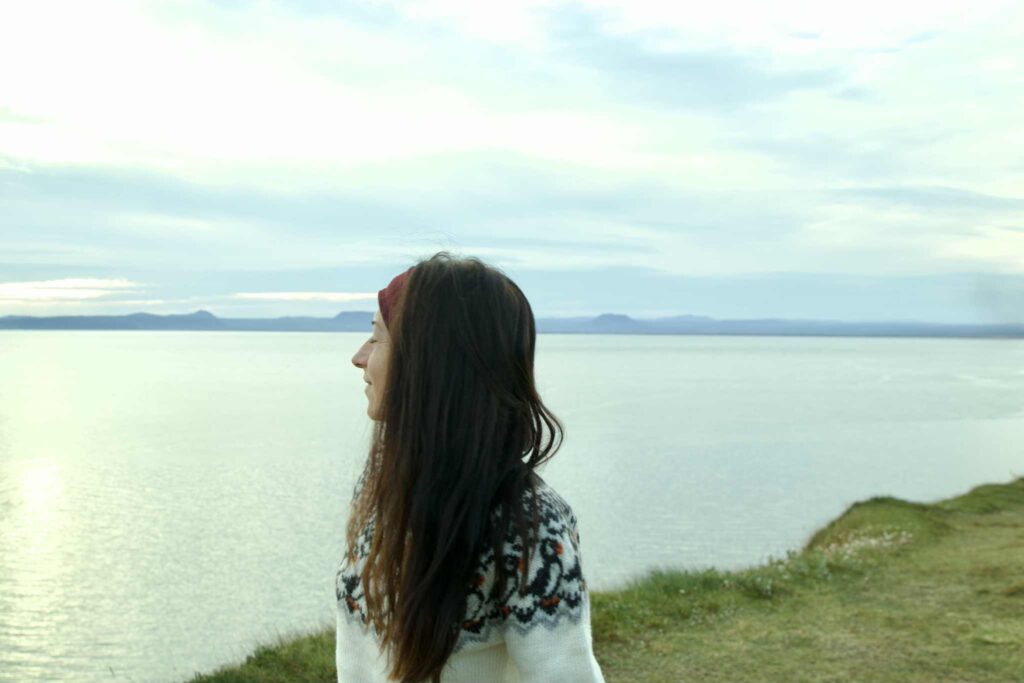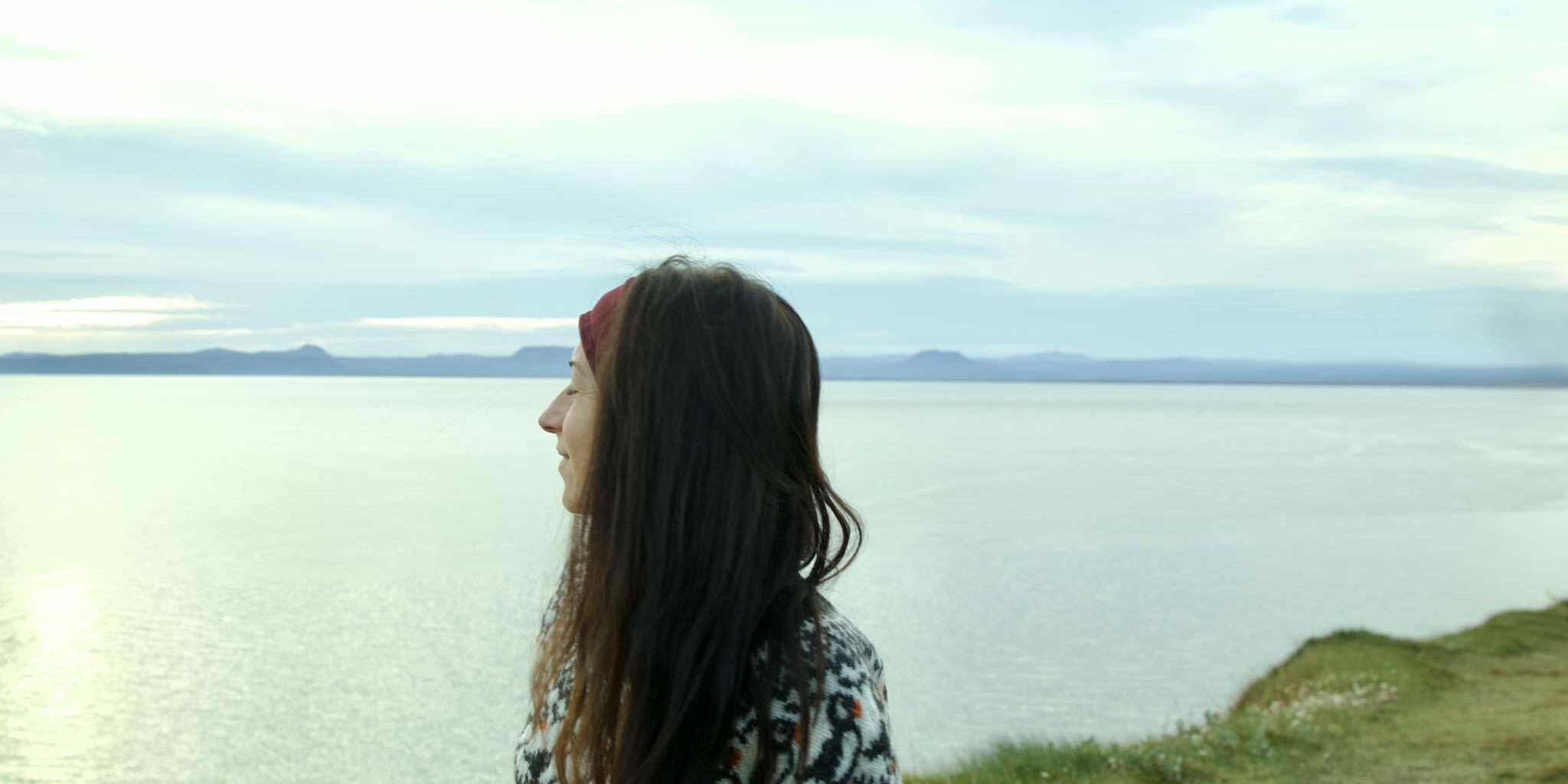When I booked my first solo camper van adventure to Iceland in 2021, I had no idea it would change my life. Destiny was calling as I gazed out at the starry night sky from my window seat. I had no plan: just a camper, a camera, the open road, and my heart to guide me.
Why I chose Iceland
Endless views, fairytale landscapes, and otherworldly scenery make Iceland the perfect destination for a road trip. For a small continent, this little island in the north packs a big punch when it comes to natural beauty. Whether it’s cruising down an empty road at sunset, hiking the dramatic landscape, adapting my plans, or brewing coffee at a scenic viewpoint, my solo camper van road trips have given me unforgettable memories and shaped me into the person I am today: daring and dreaming of more adventures to come.
What first brought me to Iceland was my interest in the sagas and Norse mythology; however, it was the nature and culture that won me over. Each time I returned, I fell more in love, experienced new places, and even made some friends.
The camper van, which I rented the same one until they upgraded to the new vans recently, became my best traveling companion. Reliable and sturdy, the 4 x 4 I rented provided a cozy and safe home while traversing the rugged F-roads, curling up after a long day exploring, or watching the sunset.
When I closed the door and dropped off the van on my recent trip, I thought it would be my last one. Not too long after, Iceland’s open roads, dramatic landscapes, and unforgettable skies were called, and I booked another one. It is safe to say there is no end to my solo camper van adventures in Iceland!
Camper van trips are not just for the twenty-somethings. At any age you can enjoy a solo adventure, and I have met travelers of all ages and genders enjoying themselves on solo road trips!
As a woman who has traveled to Iceland solo over a dozen times, most of those by way of camper van, I want to inspire you to pack a bag, book that camper van, and dare to adventure in Iceland. You will never forget it!
My Story
In 2020 the world was shut down when the pandemic hit. Like many others I was furloughed from my job. Stuck at home, I began to channel my energy into creative endeavors like writing, illustrating, and photography. A year later I published my first book, a novella called Father of Monsters based on the stories from the Icelandic Edda.
Surviving the pandemic and exploring my creative side again gave me a newfound perspective on life. I wanted to travel and devote more time to what I love. That is when Iceland and solo adventure entered the chat.
I booked a flight to Iceland for the summer of 2021, reserved a camper van, and packed a bag.
This would be my first time traveling internationally alone, and my first camper van experience. With a map, research, and advice from friends I built a loose itinerary for my first trip.
I will never forget that feeling during my flight when I gazed out the window at the thousands of glittering stars. It was my first experience with destiny and from the moment I hit the road in my camper I knew it was meant to be.
Despite my planned itinerary leading me down the south coast and back, I ended up driving the entire ring road in eight days, researching things to see and do along the way. I was smitten, and this was just the beginning of my long love affair with Iceland, photography, and solo adventures. Now I am on a mission to inspire everyone who is considering this to do the same!
Why rent a camper van
A camper van is one of the best ways to explore Iceland, especially if you are a photographer. A camper van allows for the flexibility to change plans and adapt to weather changes, and with Iceland’s unpredictable weather, this is a huge plus. One summer, I spent my trip just chasing the sun! Wherever the sun was, I went, and the same goes for the Northern Lights season.
- Renting a camper van is also an affordable option in comparison to booking a hotel and dining out. Dining out in Iceland can be expensive, and with a camper van you now have the option to cook your own meals.
- A camper van allows for a more mindful approach when you travel, but you do have to think ahead a bit.
- A camper van gives you moments you will never forget. I can’t tell you how many times I have just sat in the back of my camper with the doors open to watch a sunset or the Northern Lights. Long drives through the Icelandic countryside or venturing down an F-road are experiences etched into my heart forever.
- Camper van trips encourage community and friendship through like minded individuals you will meet. The camper van culture community is filled with diverse folks from all over the world who share one thing in common: a no strings approach and adventurous spirit for travel. The campground kitchens are a great place to meet people, exchange ideas, help a fellow traveler, or feel at home.
Is a camper van the right choice for me?
If you landed on this blog post, you are most likely a solo traveler or a woman solo traveler who either has or is considering a trip to Iceland. The thought of solo travel can be daunting, and I get so many comments when I am on the road about it. Everything from an impressed “wow, you are traveling alone in that big truck?” to the astonished, “you go alone?!”
My response is, I want to travel. I want to explore, adventure, and take photographs of what I love. If I have no one who wants to go with me, why should I wait?! And the same goes for you. It may be scary or intimidating, but once you get out there on the open road and travel your way, you will understand why it is so addictive!
Anyone can take a camper van trip to Iceland, but there are a few things a solo camper should have in mind.
- If you are renting a 4 x 4 van and plan for some F-road drives, you need to possess a fair amount of knowledge regarding F-roads and be a skilled driver. I would not recommend this if you do not have experience driving a larger vehicle on rough terrain.
- A camper van is not for someone who needs luxury while traveling. I have found my camper van to be quite comfortable; however, please note that you will be using the showers and kitchens in the campgrounds, which vary in condition. There were times during a long trip ( 4- 6 weeks) when I craved a luxurious shower. During those times, I visited one of the many hot springs, like Hvammsvik or Geosea Spa, for a break from the campgrounds.
- Camper van travel is suitable for all ages. I am a middle-aged woman, and I enjoy this way of traveling, as long as I do my yoga stretches every day to keep limber from the long drives.
- Most camper vans come equipped with all the essentials, including a stove, refrigerator, charging station, bedding, coffee press, and sink. Others have options to add on a table and chair ( for outdoor eating), blankets, a sleeping bag, and a GPS. I do recommend the add-ons. Although the vans are equipped with heat, it can get chilly, especially during the shoulder season and winter, and I have had to use the sleeping bag.
- Adaptive equipment and folks with disabilities. If you have specific needs related to a disability or require adaptive equipment, please get in touch with the camper van company to ensure you can be accommodated. Most camper vans come with a sofa that can be converted to a bed; however, it can take a fair amount of strength to operate, as do the sliding doors, especially on the larger vehicles.
Some questions you can ask yourself as you make your decision:
- Do I enjoy traveling with more adventure, less luxury?
- What are my goals with this Iceland trip?
- Have I tent camped before and did I enjoy it?
- What is my level of driving skill?
- How do I feel when I am alone? A solo trip does require a fair amount of time being oneself, which, for me, has been incredibly healing and eye-opening. It can also teach you self-sufficiency, problem-solving skills, and more about yourself. If you are afraid to travel alone but want to, I highly encourage you to be curious about why. If solo travel is new for you, be open to the possibilities and know that taking a chance may change your life.
If you are an adventurous soul looking for flexibility and a chance to see more of Iceland, then a camper van is the best choice for you!
Is Iceland safe for solo woman travelers?
Yes. Iceland was just voted one of the safest countries in the world for the 17th year in a row by the Global Peace Index.
Of course, anything can happen anywhere, and I encourage you to be aware of your surroundings, especially in Reykjavik, but I have never felt unsafe in Iceland.
How to rent a camper van in Iceland
Renting the van is a fairly straightforward process. I use Happy Campers out of Njarðvik and I have for years. The van company will most likely offer an airport pickup and drop-off. When you arrive, someone will be at the arrival hall in Keflavik airport to greet you. From there, you will be taken to their headquarters, where you can relax with a cup of coffee, use the restroom, and even collect any essentials from the community pantry, like paper towels or peanut butter.
There is a Bonus and a Kronan grocery store, not too far from Happy Campers, where you can go grocery shopping. Happy even has its own campground right next door, providing convenience, especially for weary travelers. I usually have a general idea for a menu and stock up on my essentials such as coffee, milk, Skyr, fruit, and pasta. My go-to meals in the camper usually consist of hot dogs ( Icelandic hot dogs are delicious!), egg scrambles with potatoes and spinach, or pasta. You also can’t go wrong with Skyr yogurt and oatmeal.
I highly recommend limiting your activities for the first day, as most travelers arrive in Iceland tired. One thing to keep in mind if you are a solo traveler is your driving endurance. Unfortunately, car accidents do happen in Iceland. Most are either weather-related or fatigue-related. Know and respect your limits, especially that first day. I suggest a grocery stop, a visit to the Viking World Museum, a spa visit, or a hike to the Reykjadalur thermal rivers for the first day to stretch the legs and soak in the mineral-rich waters! Then, early to bed at a campground close by and wake up refreshed to hit the road!
I don’t always suggest insurance, but when renting a vehicle in Iceland, I recommend choosing the highest coverage package. Iceland is famous for having some of the most unpredictable weather and rough roads. On my first trip, I got a flat tire in my camper van when I drove on a gravel road on Snæfellsnes. I was lucky that the insurance I had covered it. Trust me and give yourself peace of mind, take the insurance!
If your budget allows, rent a 4 x 4. Iceland has a few rough roads, especially if you plan on going to places like Stuðlagil Canyon, Dettifoss, or the interior. A 4 x 4 will give you the security you need on the rugged terrain.
To rent a camper van, you need a valid driving license and a credit card for incidentals. Happy Campers offers seasonal specials at a discounted rate, especially during the winter and shoulder seasons.
What not to do in Iceland
With a dozen trips and more to come, I want to share what to do and what not to do in Iceland, as I have made some mistakes through the years myself.
- Rush and try to see everything. No matter how fast you go, you will not see everything there is to see in Iceland. I recommend choosing your must-dos and building around that. Give yourself time to enjoy Iceland. Keep in mind that driving in Iceland can be tricky. The Ring Road is mostly a straightforward drive, with sheep being the biggest obstacle in the spring and summer months. Allow for extra time for stops, and in case there is something else, such as a fantastic viewpoint, you can stop and take a look. When heading into the fjords, allow for extra time due to the winding nature of the roads. Remember, respect your limits and be mindful. Enjoy each stop you make and the campgrounds. You can always return!
- Attempt to drive the Ring Road in one week. “The Ring Road” in Iceland, officially Þjóðvegur 1 or Highway 1, is an iconic 1,322-kilometer (821-mile) road that circumnavigates the entire island, connecting most towns. Can it be done in one week? Yes. Is it advisable? No. I did the Ring Road in 8 days, and although I saw a lot, I missed a lot, and most of my stops were rushed. For a Ring Road trip, I suggest a minimum of 10-14 days to allow for sufficient time at each place to enjoy it.
- Drive in bad weather. Do not underestimate the Icelandic wind and snow. I am a reasonably skilled driver with experience driving through a snowstorm on Loveland Pass in Colorado. Despite this, I can say with certainty that I was terrified while navigating a mountain pass in the West Fjords during a bad storm. It was a race to leave the area to beat the storm, but my companion and I, as well as a dozen other travelers, were not so lucky. At one point, I could no longer see the road, and the wind rocked my camper so violently that I thought we were going to drift into a snowbank. We sat stranded with other cars, unsure of what to do as a very brave plowman tried his best to direct us. I decided to drive back to Isafjordur, and the journey back was harrowing, yet still not as scary as being stranded in a complete whiteout. The wind can create blinding snowdrifts. Floods and unmaintained roads are not uncommon, and I have experienced some frightening driving conditions even in the summer months on the South Coast. The best way to avoid this is to download safe.is and check the road conditions before you head out. The app is frequently updated and provides accurate information. Obey the road closures and nature in Iceland so you can have a safe and memorable journey for the right reasons!
- Speed. Iceland has really cracked down on speeding by installing cameras on many of the main roads, including the route to the Blue Lagoon, the Ring Road by Hella, and the tunnel in Akureyri. Speeding tickets are expensive, and it is dangerous. In the spring and summer months, sheep and lambs sometimes drift onto the roads. Roadways sometimes convert to gravel or one-lane bridges with little warning. Obey the speed limit, and allow the crazy drivers to pass you.
- Drive off-road. This is obvious, but needs to be stated because some people may not be aware. Driving off-road in Iceland is illegal and can damage sensitive flora and landscapes. The fines are hefty if you are caught.
- Drive when you are tired. One of the challenges that comes with solo travel is that you only have one driver. Drives in Iceland can sometimes be long, especially the stretches around the fjords and from the East to the North coast. Respect your limits, and know when to find a safe place to make a coffee or grab a Collab energy drink. I always scout additional campgrounds between destinations in case I need to stop earlier than I expect.
Now that we covered some of what not to do in Iceland, let’s talk about what to do on your trip!
What to do in Iceland
Make a loose plan, but please be open to any changes. Icelanders live by the saying Þetta Reddast, which essentially means “It will all work out.” In a country filled with volcanoes, unpredictable weather, and harsh nature, you have to adopt this way of living to survive. Be aware that you may need to adjust your plan according to weather conditions and fatigue levels. Go with the flow, and you will have a happy and relaxing trip, even if you choose to be very active!
Savor each moment and every day. Slow down and savor the simple moments. Some of my best times in Iceland have been when I put the camera down to watch a sunset.
Slow down. This goes with savoring the moment. Slow down and don’t overbook your days.
If your trip is short (5-7 days), pick a region like the West Fjords or Southcoast and focus your time there. You will get more out of your vacation if you take this approach than attempting to zoom around the entire Ring Road in one week.
Drive the Ring Road if time allows. And on that note, if time allows and weather cooperates, plan the ultimate Iceland experience and cruise the entire Ring Road. A camper van is really the best way to do this!
Be spontaneous. On that note, allow for spontaneity! Don’t be so fixed on the next destination that you lose sight of what’s in front of you. Have I mentioned I skinny dipped with seals in the West Fjords because I was inspired by a local to do it?! I could have waited for the campground showers to open, but instead I decided to be brave and take the plunge. I will never forget it!
Treat yourself. Just because you are alone and renting a camper doesn’t mean you can’t treat yourself to breakfast or dinner. Iceland is home to some of the best cafes and local fare. I recommend locally owned Litli Bær in the West Fjords for homemade waffles and jam.
Talk to locals. Icelanders can seem unfriendly at first, but they are very friendly once you talk to them. They enjoy it when visitors show an interest in their culture and land, and will be happy to share some stories or answer questions!
If time allows, go North. If you genuinely want to experience a sense of wildness and freedom, head to North Iceland. Here you can read more about planning a vacation to Iceland’s lesser-visited region.
Do a few tours—budget for a tour or two. Tours are a great way to see remote and hard-to-reach places like Thorsmork, make friends, and support local businesses. Since I am solo, I like booking hiking tours like this one to the pristine jewel Hornstrandir. I feel safer and learn more about the area.
Visit the West Fjords in the summer. The West Fjords will leave you speechless. This remote, lesser-traveled region is rich in culture, boasts stunning views, features natural hot springs, and is surrounded by breathtaking natural beauty.
Include culture. Include culture on your trip by visiting a few museums or a wool store like the Handknitting Association in Reykjavik.
Journal and document your journey, even if it is just for you! I am thrilled that I took numerous pictures and even videos of myself during my first visit to Iceland. I look upon them with fondness, and they serve as a great reminder never to lose that awe. Solo travel is an excellent opportunity to learn more about yourself and grow as a person. A journal helps with that.
Plan a night visiting the Westman Islands for puffin watching or sail to Grimsey for a real remote Arctic adventure. With so much to see on the mainland, it’s easy to forget that Iceland also has islands that are just as interesting and stunning. Summer is a great season to hop over to Westman or Grimsey in the north to see puffins. Westman is only a 40-minute sail from Landeyhöfn and has a great campsite as well as a Beluga sanctuary, volcano hikes, and trails to explore. It is also home to the famous “elephant rock.”
Campgrounds
Camping is allowed only in designated areas in Iceland. There are a few things you need to keep in mind. There are campgrounds all over the country, however some close in the shoulder seasons. If you are planning on visiting Iceland in late August through June I highly suggest checking online for a campgrounds operating hours.
In the summer months, most campgrounds are fully operational. Campgrounds vary by size and amenities. Some of them are more robust than others, offering campers showers, washing machines, indoor kitchens, and a lounge area. Most of the time, there is an extra surcharge for hot water and washing machines. I recommend bringing Icelandic króna with you just in case there is no warden to give you change. Most showers take 100 króna for hot water.
Other campgrounds, such as Þykkvibær on Iceland’s south coast, are more basic, offering campers two outdoor sinks and indoor toilets. There are showers available at an extra cost at the nearby pool. This is a personal choice. I have enjoyed my stay at campgrounds like this because they are usually quieter and cost less.
The more popular and amenities the campground offers, the more expensive.
Campgrounds vary in price, charging anywhere from 1400 króna for basic sites to 2400 per person.
A few of my favorite campgrounds in Iceland are:
- Westman Island campground
- Mosskogar ( cash only!) near Reykjavik
- Þykkvibær- quiet, secluded, and basic camping away from the main road in south Iceland
- Þingeyraroddi in the West Fjords for amazing fjord views.
- Moðrudalur in the East Fjords/ Highlands region
- Hjalli Kjós – North of Reykjavik for a secluded stay with open views of the countryside.
Something to keep in mind is that Icelanders are incredibly hospitable. In an emergency it is okay to reach out to the campground that otherwise may be closed if you need to bed down for a night. This happened to me in the West Fjords during a bad storm. It is always best to reach out for help than attempt to drive in bad weather or park the camper in an unsafe place.
What time of year is best to explore Iceland with a camper van?
Choosing what time of year to visit Iceland is always a tough one because every season is beautiful!
Summer offers visitors a chance to experience the magical midnight sun and puffin watching. In contrast, the shoulder season offers fewer crowds and a chance to see the aurora with daylight available for exploration.
Winter offers shorter days, but the majesty of the northern lights and snowy scenery; however, most campgrounds close. It is entirely possible to take a camper van trip to Iceland in the winter, provided you consider a few key factors.
One is that weather-related road closures are more likely to occur. There will be less daylight for exploration; however, ample time for aurora hunting. Campers come equipped with heat and extra blankets/ sleeping bags, but please keep in mind you will have to run the van during the day to charge the heater.
With the right mindset, safety as a priority, and an adaptable spirit, winter is a spectacular time to have an Iceland camper van trip!
What to pack
For Iceland, it is always best to pack in layers. Waterproof pants, jacket, and boots are a must for any season. For a camper van trip, you want to consider the following:
- Shower shoes and shower and laundry bag for the campgrounds
- An extra pair of shoes to lounge around the campground or in the camper
- If you run cold like me, pack a set of liner gloves, a hat and a heavy pair of socks for mornings
- Most campers come with a light but I bring a headlamp for exploring or venturing to the campground if traveling outside the midnight sun time of year.
You can see my ultimate Iceland packing list here:
Ideas for a road trip itinerary
So you booked your flights and your camper, now it’s time to plan!
On my first camper van trip to Iceland, I had a very loose plan that turned into an entire Ring Road adventure! I drove the ring road for 8 days, and although I don’t recommend this, it was the trip that made me fall in love with Iceland. I spent most days exploring from 6 am to midnight, and I still didn’t see everything, including some of the best places in Iceland, such as the West Fjords and Highlands.
Some questions to ask yourself when planning your road trip:
- How many days do I have?
- What is the primary objective during this trip? Waterfalls? Puffins? Landscapes? Aurora? Culture? Photo spots?
Start there and build around that.
Here are a few ideas to build an itinerary based on length of time:
- 7- 8 days : 1 day exploring Reykjanes, 2 on Snaefellsnes, 4 days around the West Fjords
- 7-8 days: South coast to Stokknes
- 8-10 days: Ring road drive with a night on Westman Island
- 10-14 days: Snaefellsnes, West Fjords, Arctic Coast Way and return
- 10-14 days: Ring Road with time to venture to northern spots like Siglufjordur, Grimsey Island, West Fjords
Regardless of how long you choose, remember to allow for extra drive time, include backup plans in case the weather turns, or you get fatigued.
If you want more ideas for a nature-based Iceland trip, you can download my Iceland for Nature Lovers Guide.
Is this right for me?
Remember, there are no right or wrong choices in life; just experiences. Solo vacations are one of the best ways to learn more about yourself, travel the way you want to travel, and gain self-confidence. In closing a solo camper van vacation to Iceland is right for you if:
- You crave more flexibility in your travel approach.
- You are not afraid of adventure.
- You do not need the luxuries while you travel.
- You enjoy being closer to the landscapes and nature.
- You are seeking to learn more about yourself.
- You are a photographer chasing light, memories, and moments.
- You are not afraid to go it alone.
- You are afraid to go it alone, but only because it is unknown, yet you crave adventure!
I hope this post inspired you to book that solo camper van trip to Iceland. Remember to slow down and savor each moment. You can always return like I did because Iceland will steal your heart.
Let the road take you wherever your heart will lead you next.
Do you have more questions about planning a solo camper van trip to Iceland? Drop them in the comments, and I would love to help!
Links
Other useful apps to download:
Parka for parking fees at designated sites.
NorCamp for a comprehensive list of campgrounds in Iceland.
